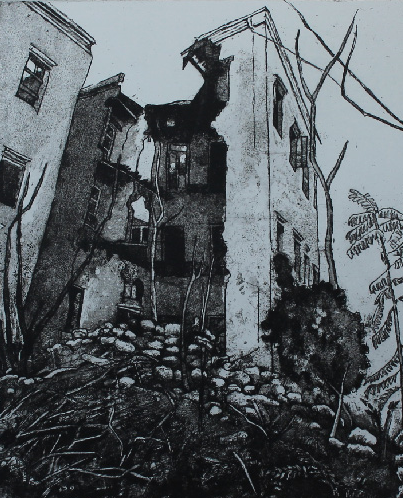About Unscathed
As a 7-year-old, she knew she was different from other French kids she went to school with.
Her parents spoke another language, her grandmother, Nona, lived somewhere far away where everything was broken, and in their nice Parisian apartment, there were, always looming, ghosts of a war no one talked about.
Nona hadn’t always lived in a small and ugly apartment surrounded by broken buildings. She had been destined for a life of ease and comfort in Cairo, until the 1958 revolution forced her to seek refuge away from home and immigrate to Lebanon. When the 15-year long civil war ravaged her second home, she didn’t leave, but sent her daughter, Amira, to live a better life in France.
Amira landed in Paris on a cold December morning of 1976. She did everything she could to live the stable life her mother wanted her to have. She studied and worked hard, she met someone, fell in love and got married. She had three beautiful French children. She never told anyone about the bombs, the dead bodies, and the fear that came with it all; and she was fine.
Amira’s eldest daughter was not as “fine” as her mother. She had the luxury to want happiness. She traded being an immigrant for being a foreigner in 2001 and left Paris for Washington DC looking for all sorts of answers. There she found love, heartbreak, purpose and disenchantment. She found out home is not a place, but rather a feeling and that identity can exist outside of nationality. She also understood that no matter how far she ran, the ghosts of untold stories from the past would continue to haunt her unless she set them free.
Writing Unscathed
My family is ordinary, happy and healthy.
But my family is also Lebanese, and in our ordinary home, the war my parents escaped—one I never experienced—was always a silent presence.
When we talk about war, we discuss casualties, death tolls, refugees, and displaced people. But we rarely talk about those who stayed “safe”, and who, out of guilt or survival instinct, live their lives haunted by trauma while pretending to be fine.
I grew up watching them, observing, critiquing, and admiring them. They are the most significant story I’ve witnessed. Yet, despite there being countless people like them, their experience remains largely untold.
There’s power in putting words to paper, healing in releasing unspoken narratives, and comfort in recognizing oneself in another’s experience.
For a few pages, through my own story, my search for identity and attempt to understand what I perceived yet never experienced, I wanted to give the spotlight to all the unseen victims of war; the ones who carry the weight of war in their hearts, in silence, as if they were unscathed.
Publication
I’m currently seeking representation.
If you’d like to know more, or if you are interested, reach out at dbahous@gmail.com.


